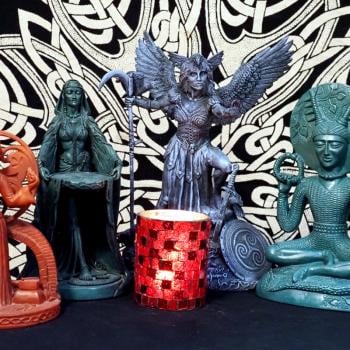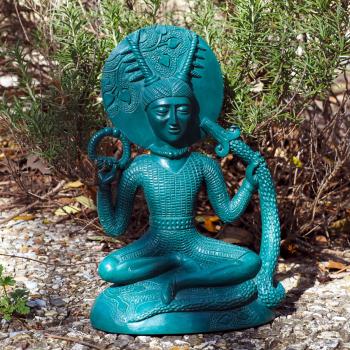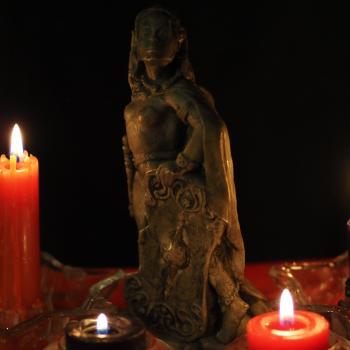There’s a t-shirt I see regularly at UU gatherings and occasionally at Pagan ones. It says “some questions are too important for answers.”
I respect the humility in that sentiment. Philosophers, theologians, and ordinary people have struggled with the Big Questions of Life for thousands of years. Many of these questions aren’t simply beyond our current knowledge, they’re beyond our capacity to know. Assuming we have certainty when we do not has been the source of countless problems, most notably fundamentalism.
In practice, though, many of the people wearing these shirts seem more interested in proclaiming our lack of certainty than in actually engaging the questions.
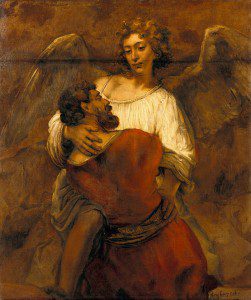
The Old Testament tells the story of Jacob, who wrestled with an angel all night, refusing to let go until the angel blessed him. In the end, the angel gave him his blessing but also put his hip out of joint. In the church where I grew up, it was said that while Jacob was rewarded for his persistence toward a worthy goal, the injury was his punishment for arrogance – for what some current polytheists call impiety.
Like most good stories, this one has many possible meanings. Blessings – wisdom, enlightenment, magic – do not come easily. The blessings of the really important questions do not come from simply acknowledging their presence. Their blessings come when we wrestle with them: when we propose answers, when we try them on and see how they fit. Their blessings come when we weigh the various answers for strengths, weaknesses, and meaning. Their blessings come when we read and study and meditate and contemplate, and when we discuss our findings with others.
As Jacob’s injury shows, wrestling with Big Questions is not without risk. You may have your assumptions challenged. You may lose your comfortable ignorance. You may be forced to confront parts of yourself you’d rather leave hidden. Initiations – whether in ritual or in the ordinary world – leave you changed. Those changes aren’t always pleasant and sometimes they’re painful.
There is perhaps no bigger question – and no more dangerous question – than that of the gods. What are they? Who are they? What do they offer us, and what do they want in return?
There are many possible answers. If after an appropriate amount of wrestling you’ve settled on one that is meaningful and helpful to you, then I’m happy for you. For any absolutists readers, that doesn’t mean every answer is right. It means this is a Big Question that we can’t answer with certainty. I’ll judge your theology by how it motivates you to be a good person, not by how closely it matches mine.
There are many thoughts on the gods in the Big Tent of Paganism: hard polytheism, soft polytheism, duotheism, pantheism, non-theism. As you try them on, though, remember that we live in a culture dominated by Christianity and by materialism. It is very easy to view the goddesses and gods of our ancestors as variations on the popular view of the god of Christianity: as omniscient and omnipotent and greatly concerned with our well-being. But if there are many gods they are by necessity limited in power and scope.
It’s also easy to view the gods as purely psychological phenomena and believe they exist only as products of our brains. Some forms of Paganism teach this, indirectly if not explicitly. That’s not necessarily a bad thing. I’m reminded of my favorite book subtitle of all time, from Lon Milo DuQuette’s Low Magick: “It’s All In Your Head … You Just Have No Idea How Big Your Head Is.” Even if goddesses and gods are purely psychological phenomena they are still mighty and powerful and worthy of our respect and emulation.
I’m a polytheist, but I’m not concerned with Pagans whose answers differ from mine. As with Christians and atheists and others, I’ll judge their theology by how they live their lives, not by how closely their thoughts match mine.
But I am concerned with two things. I’m concerned with Pagans who fail to wrestle with the questions and thus adopt a view of the gods that is weak and unhelpful. I want Paganism to be a robust religion (or if you prefer, religions) on its own, not just an environmentally friendly version of the mainstream. And I’m concerned with Pagans who profess to be polytheists but who tap out of the wrestling match and fail to consider the implications of multiple deities of limited power and scope.
Morpheus Ravenna – dancer, artist, and defacto high priestess of Morrigan – has an excellent blog post titled Gods with Agency: Ritual theory for polytheists. If you’re a polytheist, go read it in it’s entirety. Read the comments too. Here’s a key quote:
If your Gods are real to you, treat Them like beings with agency. Agency: the capacity of an entity to act. In magical terms, agency is something like will.
If our Gods are real, They have agency. We don’t get to order Them around. We don’t command Them; instead we invite. We don’t dismiss Them when we’re ready to move on; instead we say thank you and goodbye.
If our Gods are real, They don’t disappear outside of ritual space … If our Gods are real, and They have agency, They are making a choice whether or not to respond to our calls. They are making a choice whether or not to engage, to help us, to be present. We can’t be treating them like a tool you put back on a shelf when you don’t need it, and then expecting Them to come and wield Their agency for our benefit!
What would you do if the Gods were real to you?
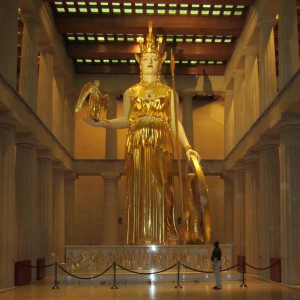
Though my early rituals were heavily influenced by Isaac Bonewits’ work, I also mindlessly copied some other rituals that “summoned” and “dismissed” deities. But when I came to the conclusion that the different experiences I had with different deities meant it was likely they were different beings, I started being more polite in my rituals.
The first time I participated in a Drawing Down ritual, I understood in a very tangible way that the gods – or at least a certain Forest God – have their own ideas and their own priorities. My personal growth was a secondary concern, and my comfort and convenience wasn’t much of a concern at all.
I still struggle with maintaining a reciprocal relationship on a daily basis. My prayers are consistent, but my devotions and offerings aren’t. And I think it’s time for more wrestling – for more diligent work to experience the gods first-hand and to learn more about them in the process.
Like all the Big Questions of Life, the nature of the gods is ultimately uncertain. We can choose to ignore these big questions and carry on with our lives. We can give them some casual thought, then drop them when they lead us to places that are inconvenient.
Or we can wrestle with the gods, in full knowledge that we may be injured and we will be changed, and through our wrestling find answers that bring us meaning and wisdom.









